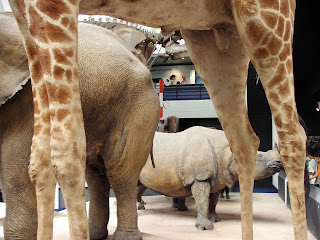LONDON MUSEUMS
Words
and Pics by Allison O’Donoghue
Victoria
and Albert Museum.
The Victoria and Albert Museum is a must see
while visiting London. Set up by the Queen and Duke after the worlds fair the
museum holds wonderful works of art spanning the ages and is dedicated to the
fine and applied arts of all countries, all styles and all periods from
the1500’s to contemporary artworks.
The Dress Collection will have fashionistas
salivating with an extraordinary display of the finest Haute Couture throughout
the ages. The1920’s collection is breathtaking with classic pieces in mint
condition, from the Flapper to the more elegant eveningwear. As well as
magnificent ball gowns dating from the 1800’s. The intricate detail of the work
puts our ready to wear throwaway fashion the shame.
Different levels divide up the museum with each
level devoted to diverse disciplines from ceramics, glass and jewelry to
musical instruments and a dedicated art deco section. Worth a look is the
Raphael Gallery which has six massive paintings commissioned by Pope Leo X in
1515. The Sculpture Gallery has original works by Rodin and other great
artists. The Cast Gallery has replicas of Michelangelo’s David and Trajan’s’
Collum if you can’t see the real thing then the cast version will suffice.
The Asian collection is amazing and vast and it
takes up a whole floor. As does the North American Indian displays with a
complete Indian Chief dressed in an original costume and artifacts brought back
by the colonists of the Americas during the British invasion of the US.
The Henry Cole Gallery houses the best of British
art as well as Rodin bronzes and the finest miniature portrait gallery in the
world. The exhibitions will take quite a few hours so if you need to rest you
can relax in the courtyard café.
Main entrance is on Cromwell Rd in Kensington and
Earls Court. Take the tube to South Kensington station. Open daily 10 am to
5.30 pm. Tours meet at the main entrance and vary throughout the day.
www.vam.ac.uk
Natural
History Museum
Just down the road from the V&A is the
Natural History Museum, which houses the largest collection of Charles Darwin’s
work in the world. Stands to reason – he was British and was responsible for
the discovery of Natural Selection and the survival
of the fittest ideology, which has yet to be challenged, even though he was
ridiculed and judged throughout his lifetime for his views. A panel of experts
originally rejected his work however he persisted and is now hailed as the
resident genius. And is celebrated and idolized within this museum with proud
displays of busts, statues and plaques of Charles Darwin everywhere.
The Natural History museum is home to a dazzling
array of all creatures great and small, from a mechanical T-Rex to a complete
skeleton of a Tricretops. Miniature and large test tubes display fascinating
unearthly critters in formaldehyde. Complete with an interactive Human Biology
Gallery.
The butterfly and bug collection is vast and
varied. Colourful displays of minerals, rock and all things geological as well
as stuffed animals from every place on earth. This is a fun place for young and
old to enjoy.
Outside is a butterfly atrium, which you can
enter, and mill around observing these beautiful short-lived creatures as they
rest on your shoulder.
The History Museum building itself is enormous
with elaborate architecture befitting a museum of world stature.
Cromwell Rd. Kensington. Open daily 10am to
5.30pm. Free entry Sunday.
www.nhm.ac.uk
Ticket sales: 7942 5000
www.nhm.ac.uk
Ticket sales: 7942 5000
British
Museum
You enter into the Great Court an open expansive
area swallowed up by a newly built special exhibition space, although the hall
can accommodate it, as it is huge. The magnificent staircase takes you into the
main museums, which is, choked full of collections form around the world. Give yourself plenty of time, as there
is so much to see, it’s worth devoting a day. If you want some peace and quite
then the ornate reading room is worth a look with ancient books on display in
atmosphere controlled exhibition display boxes.
The British Museum houses over 50,000 items
spanning the globe with vast collections of Egyptian, Iranian and Persian
sculptures, artworks and artifacts. And of course the contentious Elgin Marbles
taken from the Parthenon. There is a disclaimer before you enter of how the
Elgin marbles came to be in British hands. The museum somewhat justifies its
position, explaining the marbles were disintegrating and in need of repair and
restoration which the Greeks at the time could not or would not invest in. And
they go on to defend the right to retain the marbles and not give them back to
Greece. The Greeks continue with their campaign to have the marbles returned to
Greek soil, however the Brits justify the need to keep them in Britain.
I have been to the Parthenon and at the time
(2008) the new museum had not been completed. It begs the question where would
the marbles have been housed if they were kept in Greece up until 2008. The
Brits have offered casts of the marbles however the Greeks want the originals
back and the British museum to have the replica cast of the marbles instead.
The debate still rages.
A must see is the Rosetta Stone, if you can get
close enough with six rows deep of people scrambling to get a glimpse of this
priceless, historic artifact. I went back a few times to get a better look. The British Museum also houses a vast collection of Roman antiquities.
Great Russell St, Russell Square. Bloomsbury. Open daily from
9am to late.
www.thebritishmuseum.ac.uk
Ticket sales: 7323 8000
www.thebritishmuseum.ac.uk
Ticket sales: 7323 8000




























No comments:
Post a Comment